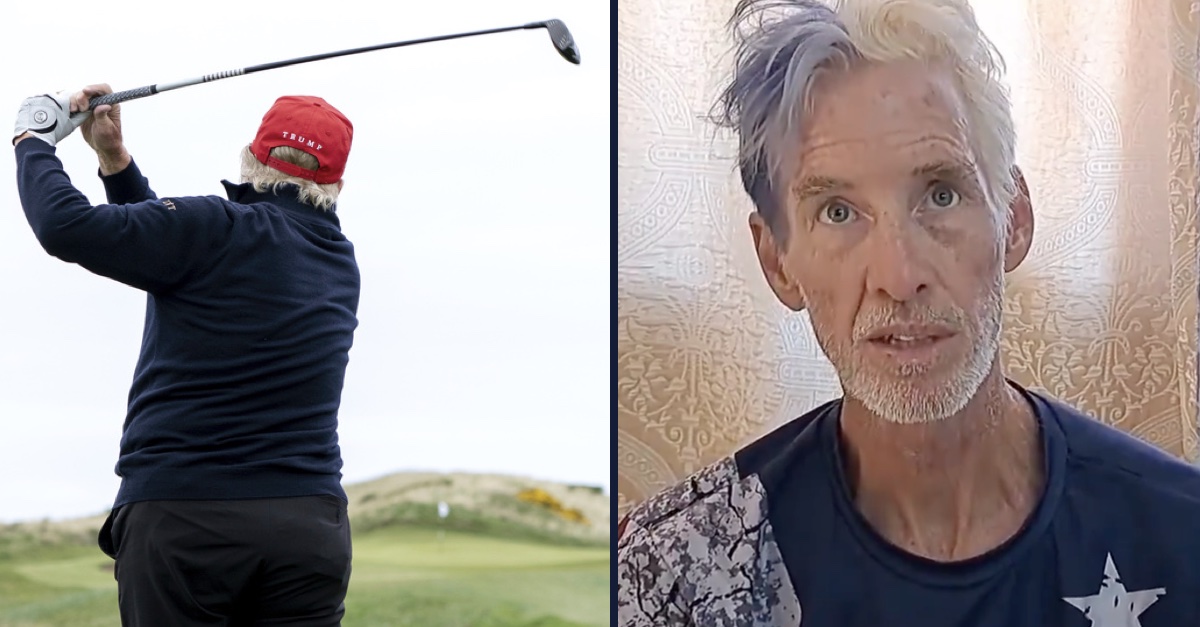
Left: Donald Trump playing golf at Turnberry golf course during his visit to the UK in May 2023. 71992040 (Press Association via AP Images). Right: Ryan Routh speaks about what he was doing in Ukraine (Newsweek Romania).
A new lawsuit accuses the Trump administration of “wrongfully withholding” records related to assassination suspect Ryan Routh, who is currently facing trial for attempting to shoot the president last year at one of his golf courses.
“The release of these records is in the public interest because it would inform the public about the government”s communications with Routh,” wrote the lawyers for the Center to Advance Security in America (CASA) in a complaint filed Monday over repeated pushback on Freedom of Information Act (FOIA) requests related to the Routh case by the U.S. State Department.
“Over 355 days have elapsed since the federal government received CASA’s requests, yet DOS still has not made a determination with respect to it,” the complaint says. “DOS has not produced responsive documents to CASA, has not communicated to CASA the scope of the documents it intends to produce or withhold — along with the reasons for any such withholding — and has not informed CASA of its ability to appeal any adverse portion of its determination.”
The lawsuit, which was filed in U.S. District Court for the District of Columbia, accused State Department officials of not meeting their “statutory obligations” to provide the records. CASA has submitted four FOIA requests related to the Routh assassination attempt at one of Trump’s golf courses in Florida last year.
Routh, 59, is charged with attempting to assassinate a major presidential candidate, assaulting a federal officer and multiple firearm violations. He has pleaded not guilty and is representing himself in court.
“DOS is an agency subject to FOIA and therefore has an obligation to release any non-exempt records and provide a lawful reason for withholding any materials in response to a proper FOIA request,” the complaint says. “DOS is wrongfully withholding non-exempt agency records requested by CASA by failing to produce non-exempt records responsive to its request.”
Love true crime? Sign up for our newsletter, The Law&Crime Docket, to get the latest real-life crime stories delivered right to your inbox.
CASA’s lawyers argued that the State Department’s alleged failure to make that determination within the allotted time period required by law warrants demands “immediate judicial review” after the group says it exhausted all of its options. CASA has provided copies of at least four separate FOIA requests filed on Sept. 17, 2024. They are seeking records from the U.S. Embassy in Ukraine, the Office of the Secretary, and the Office of the Coordinator of U.S. Assistance to Europe and Eurasia, along with several other State Department subdivisions.
“For each of these requests, DOS followed a similar pattern of initially acknowledging the requests and then going silent after informing CASA that a search was ‘in process’ without any estimated production date,” the complaint charges. “For all four requests, DOS failed to fulfill its statutory obligations under FOIA and appears unwilling to do so absent litigation.”
State Department officials said in an email sent on Oct. 9, 2024, that they would be unable to respond to the requests within 20 days due to “unusual circumstances,” per CASA’s complaint. The State Department allegedly updated the statuses to say “In Process” before going dark.
“The Center to Advance Security in America (CASA) is a nonpartisan organization dedicated to improving the safety and security of the American people,” the group said in the FOIA requests. “CASA educates and informs the American people about the actions of their government and its officials that impact their safety; peace and security; democracy, civil rights, and civil liberties; and privacy.”
The group is seeking declaratory and injunctive relief to “compel compliance” with the requirements of FOIA, according to the complaint. It has asked the court to order the Trump administration to produce the requested “non-exempt records” within 10 days of any order that is issued, or by any other date that the court deems appropriate.

